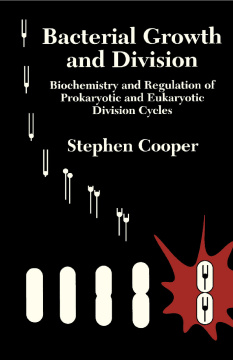
Additional Information
Book Details
Abstract
How does a bacterial cell grow during the division cycle? This question is answered by the codeveloper of the Cooper-Helmstetter model of DNA replication. In a unique analysis of the bacterial division cycle, Cooper considers the major cell categories (cytoplasm, DNA, and cell surface) and presents a lucid description of bacterial growth during the division cycle.
The concepts of bacterial physiology from Ole Maaløe's Copenhagen school are presented throughout the book and are applied to such topics as the origin of variability, the pattern of DNA segregation, and the principles underlying growth transitions.
The results of research on E. coli are used to explain the division cycles of Caulobacter, Bacilli, Streptococci, and eukaryotes. Insightful reanalysis highlights significant similarities between these cells and E.coli.
With over 25 years of experience in the study of the bacterial division cycle, Cooper has synthesized his ideas and research into an exciting presentation. He manages to write a comprehensive volume that will be of great interest to microbiologists, cell physiologists, cell and molecular biologists, researchers in cell-cycle studies, and mathematicians and engineering scientists interested in modeling cell growth.
- Written by one of the codiscoverers of the Cooper-Helmstetter model
- Applies the results of research on E. coli to other groups, including Caulobacter, Bacilli, Streptococci, and eukaryotes; the Caulobacter reanalysis highlights significant similarities with the E. coli system
- Presents a unified description of the bacterial division cycle with relevance to eukaryotic systems
- Addresses the concepts of the Copenhagen School in a new and original way
"Stephen Cooper, one of the most original and experienced workers in the field of bacterial growth and division, has written a book that is as unconventional as it is interesting. His thoughts are clear, presented in an engaging style, and accessible to all. There is something here for everyone." --CELL
"A particularly welcome addition that will be useful to researchers, teachers, and advanced students. This volume presents a comprehensive review of the experimental evidence concerning the cell division cycle at the level of the individual cell and its regulation. As such, it is a unique and useful companion to other recent books that focus on the broader physiological, genetic, and biochemical issues of bacterial growth and its regulation. This book is especially attractive because it presents a focused physiological and biochemical review of the fundamental bacterial division cycle. Much of the presentation is framed within the context of the Copenhagen school that has spawned so much exciting information on microbial physiology over the years. Many unique models are used to illustrate key concepts and mechanisms." --ASM NEWS
"Fascinating... opens the scientific windows on the understanding of an expert within a specialist field. A highly detailed and careful analysis of experiments conducted by the author and by others. Refreshingly different. For a book of this length and scientific rigor its price is very reasonable, and it will prove to be a very useful reference book for those who carry out research in this area for many years." --TRENDS IN CELL BIOLOGY
"Although this book is devoted to the bacterial cell cycle, it is also a book on principles in biology and how living systems should be approached. Cooper is deeply convinced that, beneath all differences, a fundamental general unity in biology exists. Besides the unity in biochemistry, is also a unity with regard to the division cycle because of its logical construction. The book is well organized and the text is easy reading. The illustrations are superb and extremely helpful... An extensive list of index entries has been compiled and an impressive number of references are cited. There is also a list of all figures and tables and at the end of each chapter clarifying notes have been added. For years this book will serve as a standard for everyone looking for a refreshing overview of the bacterial cell cycle. In addition, I strongly recommend this book for advanced students who are interested in this topic because it is one of the rare scientific books that really can fascinate and inspire the reader. The book has its great merits in that it avoids just reviewing the facts but rather tries to describe how current ideas evolved from the experimental results. As stated in the prologue Cooper did not want to take away the human aspect of sciences. Indeed, it is a very human book and I gained a lot by reading this book because it is by Stephen Cooper." --BULLETIN OF MATHEMATICAL BIOLOGY From the Prepublication Reviews: "The content of this book centers on the processes that occur during growth of a single bacterial cell. Through the years, Dr. Cooper has made seminal contributions to our understanding of the bacterial cell cycle. This book is the result of his efforts to draw together and sift through almost all experimental data available in order to arrive at conclusions concerning the interconnectedness of division, DNA replication, cell growth, and the cell cycle. Readers may disagree with his sometimes strongly stated interpretations, but I encourage them not to be dissuaded because the book is a scholarly presentation of many important ideas. In fact, it is a major achievement dedicated to remembering and learning from the past." --Judith W. Zyskind, San Diego State University, California
"I think this is a marvelous manuscript. The style is informal and discoursive. I had a wonderful time reading it and hope that you will be able to publish it promptly. I greatly enjoy an author who has definite opinions and who is not afraid to state them. In my view this manuscript suggests a book that will be widely read and discussed. It is certain to generate some controversy, but I believe that the arguments made by Dr. Cooper are fundamentally sound." --Edward A. Birge, Arizona State University
